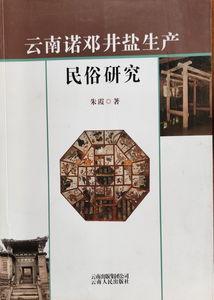Zhu Xia 朱 霞 obtained her PhD in Folklore studies at Beijing Normal University in 2004. Presently she is an Associate Professor at the Institute of Literature at the same university, doing mainly research on traditional technologies, especially those among China’s minority peoples. Some of her publications include Yunnan Nuodengjing yan shengchan yanjiu 云 南 诺 邓 井 盐 生 产 民 俗 研 究 (An Investigation of Folk Customs relating to Salt Production at the Nuodeng Well in Yunnan), Kunming 2009, “Yunnan shaoshu minzu zaozhi jishu de diaochao ji yanjiu” 云 南 少 数 民 族 造 纸 技 术 的 调 查 及 研 究 (Investigation and Research on the Paper-making Technology of Yunnan’s Minority People), Minzu yanjiu 民 族 研 究 (Research on Nationalities), 1 (1999): 49-62, and “Minjian lushui ziyuan fenpei yu guojia zaohu zhidu” 民 间 卤 水 资 源 分配 与 国 家 灶 户 制 度 (The Distribution of Brine Resources among the People and the State System of Salt-boiling Households), Yunnan shehui kexue 云 南 社 会 科 学 (Yunnan Social Science Research), 1 (2007): 73-83.
Publications
The Production of Well Salt by Ethnic Minorities in Pre-modern Yunnan
The “Illustrations on the Salt Production Methods of Yunnan”
Abstract: This paper makes use of regional historical sources to analyze and investigate the “Illustrations on the Salt Production Methods of Yunnan” (Diannan yanfa tu 滇 南 鹽 法 圖 ), a scroll held by the Chinese National Museum in Beijing. It postulates that pre-modern Yunnan salt works can be divided into three basic types: natural brine springs, brine wells on land, and brine wells in the middle of rivers. The last type, in particular, is characteristic of Yunnan well salt production. At the same time, this paper also discusses the arts of hoisting and transporting brine as well as the methods of boiling brine and forming salt, thus highlighting the diversity of Yunnan’s pre-modern well salt production methods. By reflecting the customs and practices of the Yunnan salt industry, the “Illustrations on the Salt Production Methods of Yunnan” is an important document for the history of science and technology of the ethnic minorities in the southwestern part of China.
从口述材料看民国时期的私盐运销
以云南诺邓盐村为个案
Abstract: 在中国封建社会中,食盐一直是国家的专卖的垄断商品。然而,私盐运销却一 直屡禁不止,成效微弱。在下层社会,私盐运销曾是特定群体的一种谋生方式与手 段,从事这种活动与国家的法规是相违背的,它的内部运行相当隐蔽,鲜为人知。 研究盐业史的学者较少运用口述史的材料,从下层的观点来看待这一问题。本文主 要以田野调查资料为主,以云南诺邓井盐村的私盐活动为个案,从民俗学视角来研 究诺邓村不同形式的私盐运销形式,以及形成的一些约定俗成的规矩。 本文涉及的个案是云南省云龙县果朗乡诺邓村,一个有千余年历史的盐村。 唐代樊绰的《 云南志》 记载:“ 剑川有细诺邓井”1 。明清两代更有十多种云南地方 志对诺邓井进行了记载,诺邓井于1996年封井停产。本人于2002年和2003年两次对 盐村进行了调查,访问了当地的灶户、盐工和赶马人,对民国时期盐村的私盐运销 进行了记录和了解。
